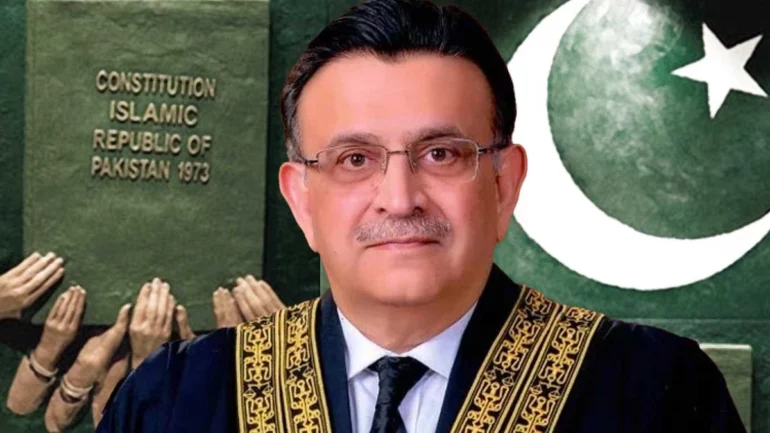Chief Justice of Pakistan (CJP) Umar Ata Bandial said on Friday expressed displeasure over lukewarm interest shown by the government and Pakistan Tehreek-e-Insaf’s (PTI) for holding a substantial dialogue over the elections.
He made these remarks while hearing a petition regarding simultaneously elections which resumed after three days of negotiations between the federal coalition and the opposition to agree on a specific date for nationwide polls.
On Tuesday, the PTI submitted a report to the court stating that no resolution was reached during the negotiations and requested that the court enforce its April 4 order regarding elections in Punjab. The three-member Supreme Court bench, comprising CJP Bandial, Justice Ijazul Ahsan, and Justice Munib Akhtar, emphasized that its April 4 order on Punjab Assembly elections remained unchanged.
After the negotiations came to an end on Tuesday, the PTI submitted a report to the court stating that no resolution was reached and requested that the court enforce its April 4 order regarding elections in Punjab.
During today’s proceedings, the CJP said the court only had to see if both sides could agree on a date for elections, adding that the SC’s responsibility was to uphold the law and Constitution.
The Supreme Court would not remain idle regarding its order to hold elections in Punjab on May 14 if the negotiations between the government and the opposition Pakistan Tehreek-e-Insaf (PTI) failed.
After conducting a hearing that lasted nearly two hours, the proceeding was adjourned, with the CJP saying that an appropriate order will be issued.
At start of proceeding, the PPP counsel presented its report before the court on the talk asserting a major breakthrough during the negotiations
During a court hearing, the Chief Justice of Pakistan emphasized that the matter at hand was constitutional, not political, adding that the Supreme Court had left political matters to political parties. The judge questioned the importance of approving the International Monetary Fund (IMF) agreement and trade policy, to which the Pakistan People’s Party (PPP) lawyer responded that getting the IMF loan was crucial for the budget. The lawyer further explained that without the assemblies, it would be impossible to approve the budget and the country would not have been in the current crisis if the assemblies of Punjab and Khyber Pakhtunkhwa were not dissolved.
The chief justice said resolving the issue required an understanding between the government and the opposition.
During a hearing, Chief Justice of Pakistan Umar Ata Bandial stressed the importance of upholding the law and Constitution, saying that the court’s responsibility was to ensure that its verdicts were implemented. He also commented on the need to avoid making decisions in anger. In addition, the CJP asked the PPP’s lawyer, Farooq H. Naek, to compare the discussions held in court with those in Parliament, highlighting the level of discussion being held in court.
Naek argued that the court should review the issue of holding polls within 90 days and emphasised the importance of caretaker governments in ensuring free and fair elections. He also stated that elections would not be accepted until the elected government was in place. The CJP referred to a previous matter when the government had not taken constitutional proceedings seriously.
“You remained preoccupied with the debate surrounding the four-three [verdict],” the CJP told the PPP counsel.
The top judge said Justice Athar Minallah had raised the point of the dissolution of assemblies, however, the government showed no interest. “Even in a discussion today, no one is talking about the law or the Constitution.”
He noted that the seriousness of the government was such that it had not filed a review appeal — on the SC’s verdict. “The government doesn’t want to talk about law but wants to do politics.”
“The government and the opposition will have to become serious,” he observed. “Leave the matter on the political parties … should the court not ensure implementation of the law? Should we turn a blind eye to the public’s interest?
“The government is bound to follow the court’s orders,” Justice Bandial maintained. “The court is showing restraint but this should not be considered as our weakness.”
At that, Barrister Ali Zafar stated that the PTI had agreed on holding elections across the country on the same day, but the only condition was that assemblies should be dissolved by May 14. “Our second condition is that polls should be held by the second week of July.”
The third condition, the lawyer went on, was that the delay in elections should be legalised through a constitutional amendment. Barrister Zafar also highlighted that May 14 was only a few days away but polls funds had not been released yet.
Railways minister Khawaja Saad Rafique said there was “deep mistrust” between institutions and political parties.
He also emphasised the importance of transparency in the 90-day demand, as mandated by the Constitution.
The minister called for simultaneous elections across the country, warning of impending destruction if elections are held in just one province.
The judge pointed out that elections had taken place even during times of major wars. “Elections took place even during the earthquake in Turkey.”
During the hearing, the CJP mentioned that the court had received a briefing on security and questioned whether there was a guarantee that the security situation would improve by the proposed election date of October 8. He further noted that assumptions were being made regarding the election date.
PTI’s Qureshi also gave his arguments and said that the government did not say anything new and had instead repeated its previous stance.
“We have tried our best to make the negotiations fruitful,” he said. “But the government benches said things that were equivalent to violating the court’s orders.”
Qureshi stated that the PTI report submitted in court yesterday included the signatures of all the members of its negotiation team, while the government’s response only included Ishaq Dar’s signatures.
Meanwhile, Qureshi contended that the coalition had sought more time saying that it comprised of 12 parties. “But, Imran Khan and everyone else criticised why a gap of three days was given,” he revealed.
The country, the PTI leader continued, was being pushed towards constitutional crisis and called on the court to look into his party’s stance.
“We have read your stance,” the chief justice replied, adding that proceedings could continue in the case regarding holding elections in Punjab on May 14. He also said that the PTI-government negotiations could again be held if both parties were interested.
Here, Qureshi argued that the government was not showing any flexibility, recalling that the PTI had “sacrificed” its governments in Punjab and KP. “There is always an environment for negotiations,” he continued, claiming that the government was just trying to waste time.
Subsequently, CJP Bandial said that the court would issue an appropriate order, adding that the political parties could continue with the negotiations if they were interested.
The hearing was then adjourned.



